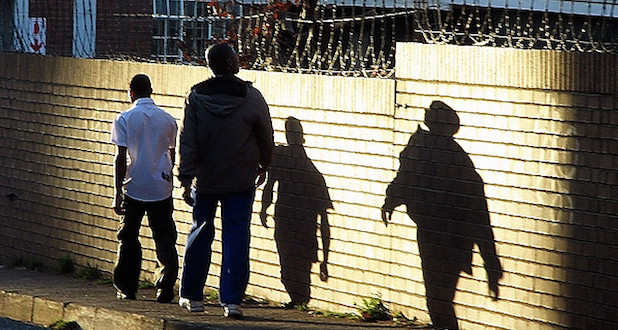If you see a black man in a suit walking down the street would you: (a) immediately cross to the opposite side of the road or (b) do nothing and go on as you were?
There’s no doubt that the idea of the swart gevaar (“black threatâ€) is still alive and kicking in South Africa. In an interview with Power FM’s Thabiso Sikwane, freelance writer Martha Mukaiwa discussed an article she wrote, and in which she reflected on her own prejudices against black men.
“We ran away from the young men in their telltale blue overalls, we shunned and teased gardeners and menial workers from a careful distance but what I didn’t understand was why I should be afraid of people whose skin looked just like mine,†Mukaiwa wrote in an article called “Black men, black fearâ€.
Mukaiwa wrote that like many other young black girls, she had been conditioned to fear a certain type of black man and that from the time she was five or six she already knew that black men were trouble, “that when they walked alone or in ragtag, guffawing groups they were up to no good and should be avoided, run from or reportedâ€.
But what if these men wore suits and shiny shoes, instead of shabby overalls and worn-down shoes?
Maybe it’s not about race, Sikwane suggested, perhaps it’s about social class.
“If a woman like me is alone at night and there is a well-dressed black man around, I still feel a little bit of fear. It’s about being black, it’s about being a black male person,†Mukaiwa said. There is an inherent fear that people (mostly women) feel towards black men, especially those that are dressed casually in some way or the other, she added.
Statistically, black men perpetrate the majority of crimes in South Africa, but black people are also more likely to be victims of crime than white people. The Institute for Security Studies conducted an analysis, which revealed that in 2009 black people were victims in 86.9% of the cases reported to the police, while white people were victims 1.8% of the time. In essence, when you see a black person walk down the street, they are more likely to be a victim of crime than anybody else.
“If you look at the media you are always bombarded with negative images of a black man. The headlines are all about this person, who is black, who raped and killed and did this, and then as a counter-point there are never as many uplifting stories about people [who are] your everyday man, because there’s a middle-class story that’s lacking,†Mukaiwa said.
The narrative in the media is bipolar: black men are either tenderpreneurs or thugs, which creates the illusion that those are the only kinds of black men that exist, she added.
Mukaiwa also elaborated on the guilt of labelling men who “are not easily identified as non-threatening†as a danger and a reason to become cautious.
Listen to the interview:
– Featured image via Flickr.









